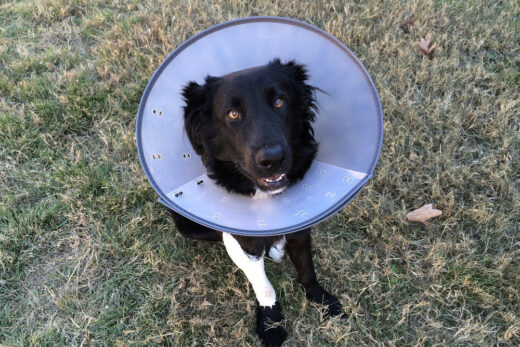CBD oil is becoming more and more widely accessible and as such, more pet owners are curious about its ability to help their dogs maintain a better quality of life. The availability of new products makes plenty of pet owners want to try administering CBD supplements to their dogs, but there are a lot of questions in the air about what CBD really is, what it does, how it’s used, and how to shop for high-quality products.

Below, we will cover all of these questions and more so that you can gather the information you need about CBD oil for dogs and how to introduce your pet to a CBD product as safely as possible.
What Is CBD Oil?
CBD is a shortened title for cannabidiol, which is a chemical compound produced by cannabis and hemp plants. When processed as a pure product, CBD does not contain THC, the psychoactive ingredient in cannabis.
CBD is often used as a medicinal product and while it’s commonly used as a human elixir, more and more dog CBD oil products are available than ever before.
How Does CBD Oil Affect My Dog?
The endocannabinoid receptors in a dog’s nervous system react to CBD oil, and according to recent studies, this chemical has been suggested to ease pain, inflammation, and anxiety when introduced to a dog’s diet. Many pet owners also supplement CBD oil into their dog’s cancer treatment plan, being that CBD oil possesses tumor-shrinking properties and helps fight the common side effects of cancer treatment.
For example, CBD oil may benefit a dog’s cancer treatment by aiding them in getting better sleep, which is a necessary aspect of any recovery. Additionally, CBD oil may also help a dog maintain a healthy appetite throughout their treatment, despite the nausea and lack of appetite that has been commonly recorded when an animal or human is undergoing cancer treatment.
What Dog Health Problems Can CBD Oil Treat?
Studies on cannabis oil for dogs suggest that this product can be used as a natural pain reliever, especially when it comes to nerve pain. It also reduces inflammation, can help control seizures, relieves nausea, reduces anxiety, and may help stimulate a dog’s appetite.
As mentioned above, CBD oil for dogs may also reduce the size of cancerous tumors, prevent cancer from spreading, prevent new tumor growth, lessen the severity of cancer symptoms, and make treatment generally easier on a dog’s body.
Some veterinary professionals have noted that CBD may be beneficial in treating adrenal disorders like Addison’s Disease or Cushing’s Disease. Because CBD supplementation can help reduce adrenal fatigue, it may be able to reduce the symptoms and progression of similar diseases.
CBD oil may also be beneficial in helping nervous, anxious dogs enjoy a better quality of life. When dosed properly, CBD has been shown to help keep a dog calm, which may be an incredible help for dogs who suffer from separation anxiety, fear of loud noises (like fireworks or road construction), become irritable during car rides, or get scared at the veterinarian or groomer’s office.
Possible Side Effects of CBD Oil in Dogs
Using CBD for dogs is determined to be quite safe, though there may be some mild side effects that occur. Most of the time, these side effects will clear up quickly without causing any damage, but to avoid them, it’s important to follow directions when administering CBD oil for dogs.
Ensure that you’re giving your pet the correct dosage recommendation, which should be listed on the CBD oil package, the package insert, or on the company’s website. If your dog is brand-new to CBD oil supplementation, consider administering half a dose so that you can watch for side effects.
Common side effects may include:
- Decreased blood pressure, which may lead to dizziness
- Dry mouth (so be sure to provide your dog with plenty of water and in turn, plenty of opportunities to go outside for a bathroom break)
- Fatigue, especially when the dose is too high
Because dry mouth and fatigue are the most common side effects of CBD dosing in dogs, it’s important to avoid further issues from developing as a result of these side effects.
For example, your dog’s mouth might be more dry than usual, so they may want to significantly increase their water intake. Allow your dog plenty of water, but try to pace the pet so that they do not vomit. Additionally, if you have a deep-chested dog, ensure that your pet’s water bowl is elevated to reduce the risk of developing Gastric dilatation-volvulus (bloat).
If your pet seems a bit drowsy, allow him or her plenty of time to nap, especially when they’re getting used to the new supplementation. The fatigue will likely stop when the dog has grown accustomed to his or her ideal dose.
Possible Risks of CBD Oil in Dogs
Though the full effects of CBD for dogs haven’t been scientifically determined, studies have not discovered any serious risks associated with giving a dog CBD oil. Though we do not know if there is a toxic dose possible, and the FDA has not yet issued a proper dosing chart, it’s unlikely that giving a dog CBD treatment will be hazardous to their health.
However, to avoid unnecessary risks or unpleasant side effects, be sure to start with very small doses when a CBD regimen on a dog. Carefully monitor your dog as you increase the size of the dose, and keep an eye out for the desired effects to occur.
Additionally, to avoid risks, it’s a great idea to consult your dog’s veterinarian for guidance as you start CBD treatment. While some states are not CBD friendly, many veterinary professionals are becoming more knowledgeable about natural treatments and therefore, many veterinarians can point pet owners in the right direction in regards to CBD oil treatment.





